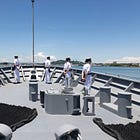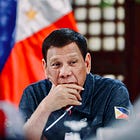Australia in talks for security pact with Fiji as Pacific strategy expands
Today’s email is brought to you by Empower your podcasting vision with a suite of creative solutions at your fingertips.

Australia is negotiating a security agreement with Fiji, Prime Minister Anthony Albanese and Fijian leaders confirmed Tuesday, marking the latest move in Canberra's broader Pacific engagement strategy amid growing Chinese influence in the region.
Former Deputy Prime Minister Michael McCormack welcomed the development during a Sky News interview, calling it "a big call and a big win for Australia if we can establish that." The negotiations were first reported by The Australian newspaper's Ben Packham, according to McCormack.
"Anthony Albanese and the Fijian leader both indicating they want to head towards a security deal," McCormack said Tuesday morning. "This would be a big call and a big win for Australia if we can establish that."
The potential Fiji agreement comes as Australia pursues multiple Pacific security partnerships, with deals expected soon with Vanuatu and Papua New Guinea. McCormack noted the government appeared close to finalizing a Vanuatu agreement, though it wasn't announced during recent Pacific talks.
"I know that they're close to getting one done with Vanuatu," McCormack said. "They didn't announce it yesterday, but with that happening, a defence treaty likely soon with PNG to be inked, the government is making some progress when it comes to relations in the Pacific."
The security negotiations coincide with Australia's announcement of new autonomous submarine capabilities, with dozens of Ghost Shark submarines to be acquired and the first becoming operational in January 2026. McCormack described the submarine program as "a timely announcement" and "a good investment."
Truth matters. Quality journalism costs.
Your subscription to Mencari directly funds the investigative reporting our democracy needs. For less than a coffee per week, you enable our journalists to uncover stories that powerful interests would rather keep hidden. There is no corporate influence involved. No compromises. Just honest journalism when we need it most.
Not ready to be paid subscribe, but appreciate the newsletter ? Grab us a beer or snag the exclusive ad spot at the top of next week's newsletter.
Pacific Competition Intensifies
McCormack, who served as Shadow Minister for International Development and the Pacific, emphasized the strategic importance of strengthening regional ties as China expands its Pacific presence.
"It's a very contested space at the moment," McCormack said. "We've got a lot of overtures by China in the Pacific Rim. And we need to make sure that our Pacific friends know exactly who their best friends are and that is Australia."
The former Nationals leader cited cultural and sporting connections as foundations for deeper partnerships, noting that "football, family" and other shared interests remain "important to the Pacific" and "important to us."
Australia's Pacific strategy has gained urgency as Beijing signed a security pact with Solomon Islands in 2022 and pursued broader regional agreements. The latest developments suggest Canberra is making headway in countering Chinese influence through bilateral security arrangements.
Trump Meeting Preparations
McCormack expressed hope that Australia's Pacific initiatives and submarine acquisitions would strengthen the country's position ahead of Prime Minister Albanese's expected meeting with U.S. President Donald Trump next week.
"Do you think as well both these elements, the autonomous subs, dozens of them to be acquired, their message about how Australia is looking after our own neighbourhood, are these messages that will resonate with Donald Trump?" interviewer Kieran Gilbert asked.
"Well, let's certainly hope so, because relations haven't been that great," McCormack responded. "And certainly Kevin Rudd, our ambassador, has not helped that process."
McCormack said he hoped the leaders could "come together in a good format to discuss the things that are important to us" including Pacific security arrangements. He emphasized the importance of addressing trade concerns affecting Australian farmers.
"Certainly the tariffs and our trade and our farmers are something that I hope the Prime Minister raises with President Trump," McCormack said.
Israel-Qatar Strike Comments
On international affairs, McCormack defended Israel's recent strike targeting Hamas leaders in Qatar, placing responsibility for ongoing conflict on the Palestinian militant group.
"The responsibility is very much on Hamas to release the hostages," McCormack said when asked about the Qatar operation. "That's the only way this conflict is going to end."
He argued Israel had legitimate grounds for the action, stating: "Given the fact that Qatar was harbouring, apparently, these terrorists, Israel is not going to take that lying down. And they have every right to defend themselves, have every right to push the point."
McCormack traced the conflict's origins to Hamas's October 7, 2023 attack, saying: "Let's not forget that Hamas began this on October 7, 2023. Let's not forget the atrocities that were perpetrated on that very, very fateful day."
When asked whether the strike might derail Qatar's mediation efforts, McCormack expressed concern about potential escalation. "I'm concerned, Kieran, very much as the world holds its breath, that it is going to escalate," he said.
Indian Migration Controversy
McCormack addressed the ongoing controversy surrounding Coalition senator Jacinta Nampijimpa-Price's comments about Indian migration, acknowledging the remarks were "not helpful" while defending the senator's subsequent clarifications.
"Senator Jacinda Namjimpa-Price has walked back a comment," McCormack said. "She said that they were clumsy and that they were unfortunate."
The former deputy prime minister argued the issue had received disproportionate attention compared to other controversial statements, specifically citing Greens senator Nick McKim's comments about wearing Palestinian symbols in parliament.
"We've had seven days of this and we've had a lot of people jumping up and down and from all sides of politics," McCormack said. "But let's not forget, no-one's asking Senator Nick McKim, who's a very experienced politician. He made some incendiary comments in the Senate chamber and elsewhere last week about wearing or his right to wear a Palestinian flag in the chamber."
McCormack said conversations with Indian community leaders suggested concerns were less widespread than media coverage indicated.
"I've spoken to a number of Indian leaders and people within the Indian community, locally and elsewhere," he said. "People aren't as concerned as what is being made out, but they were unfortunate comments."
Broader Political Context
The former Nationals leader criticized the controversy as a distraction from core policy issues facing Australian voters.
"Obviously, the fallout has also been something that has been a distraction other than what we really ought to be talking about, and that is cost of living, getting a roof over people's heads and getting the energy prices down," McCormack said.
He praised Indian Australians' contributions while suggesting the senator would exercise greater caution in future statements.
"Our Indian community are wonderful people," McCormack said. "They've done a great thing for our society and will continue to do so long into the future."
Defence Capabilities Questioned
Despite welcoming the submarine announcement, McCormack raised broader concerns about Australia's defence and border security capabilities, citing ongoing challenges with illegal imports and veteran affairs.
"We can't manage our borders at the moment such that we're getting boatloads of illegal cigarettes in," McCormack said. "We've had medallic recognition changes such that veterans will no longer be able to receive their due honours and awards, and we've got an increase in veteran suicide."
The comments reflected ongoing Coalition criticism of the government's border security and veteran support policies, with McCormack arguing "there's so much work to be done in the defence space, in our border security space."
The Fiji security negotiations represent the latest development in Australia's intensified Pacific diplomacy, as regional powers compete for influence in strategically important island nations between Australia and the United States.
Got a News Tip?
Contact our editor via Proton Mail encrypted, X Direct Message, LinkedIn, or email. You can securely message him on Signal by using his username, Miko Santos.
Sustaining Mencari Requires Your Support
Independent journalism costs money. Help us continue delivering in-depth investigations and unfiltered commentary on the world's real stories. Your financial contribution enables thorough investigative work and thoughtful analysis, all supported by a dedicated community committed to accuracy and transparency.
Subscribe today to unlock our full archive of investigative reporting and fearless analysis. Subscribing to independent media outlets represents more than just information consumption—it embodies a commitment to factual reporting.
As well as knowing you’re keeping Mencari (Australia) alive, you’ll also get:
Get breaking news AS IT HAPPENS - Gain instant access to our real-time coverage and analysis when major stories break, keeping you ahead of the curve
Unlock our COMPLETE content library - Enjoy unlimited access to every newsletter, podcast episode, and exclusive archive—all seamlessly available in your favorite podcast apps.
Join the conversation that matters - Be part of our vibrant community with full commenting privileges on all content, directly supporting The Evening Post (Australia)
Catch up on some of Mencari’s recent stories:
It only takes a minute to help us investigate fearlessly and expose lies and wrongdoing to hold power accountable. Thanks!






